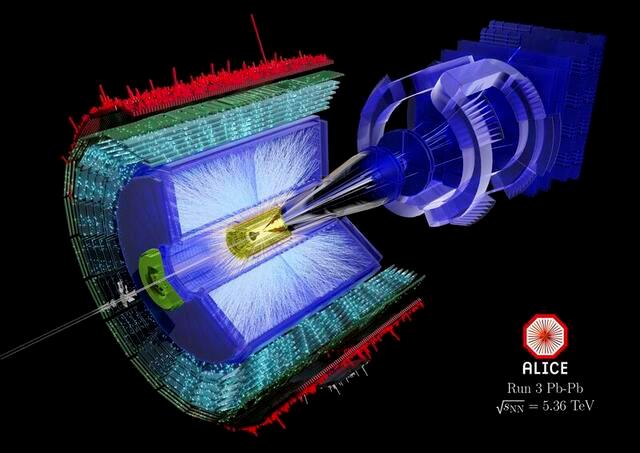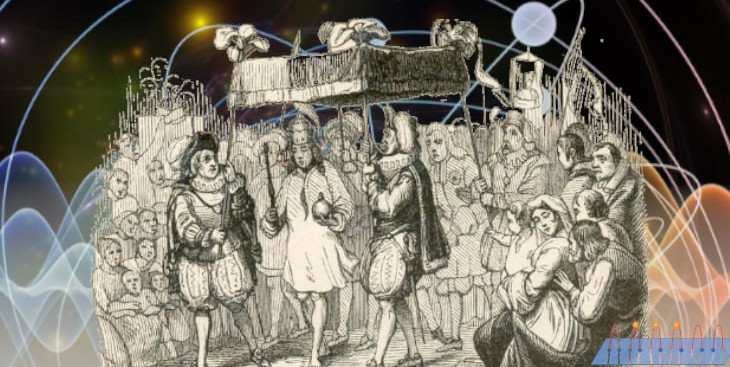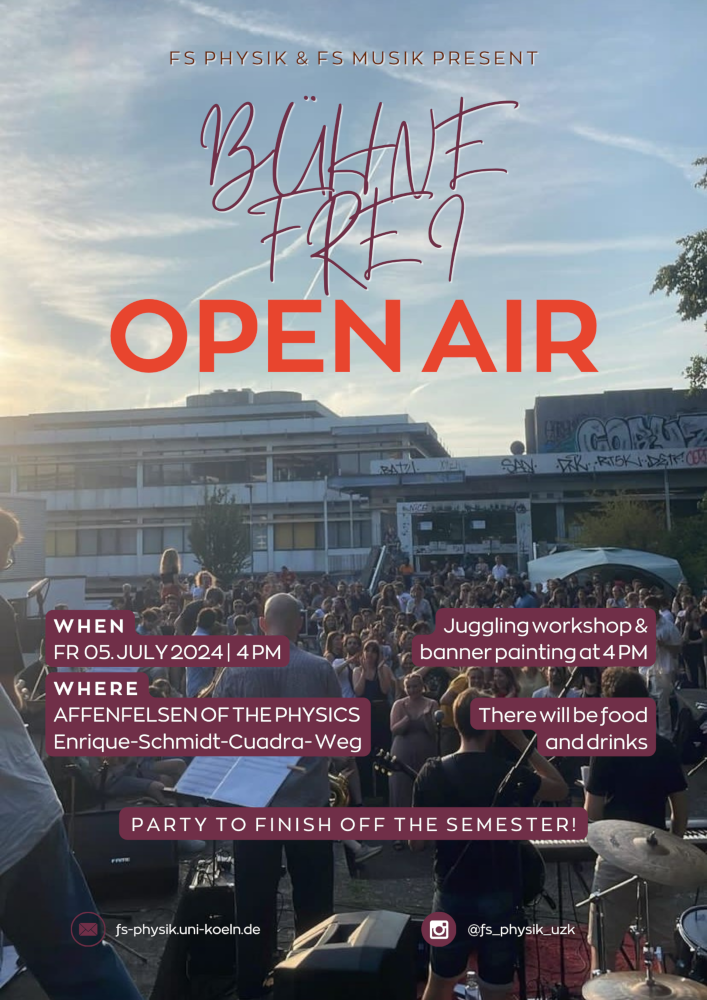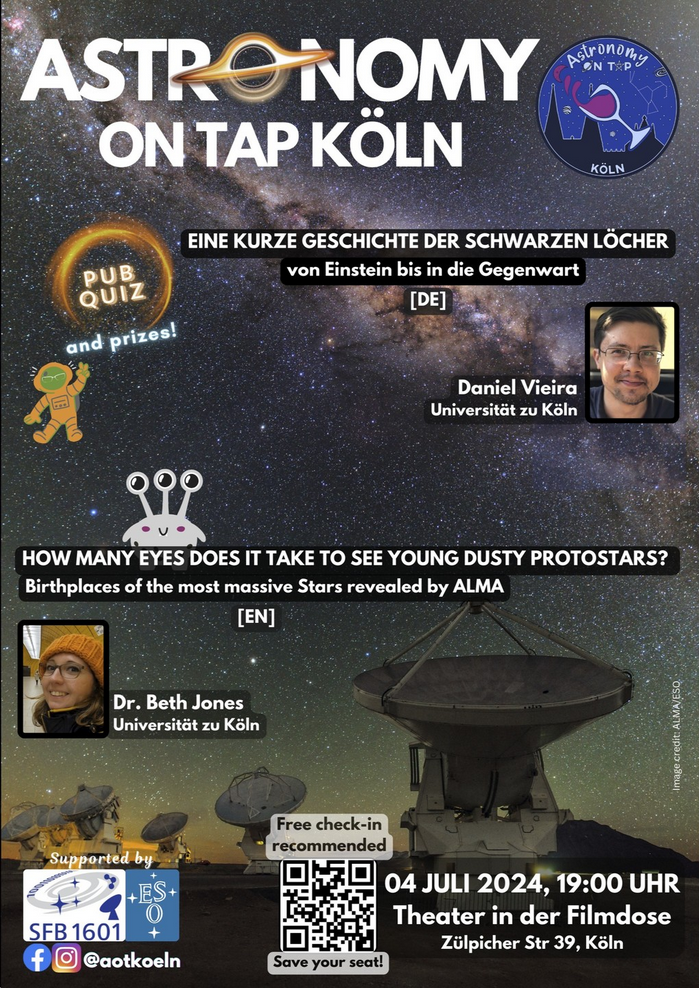GPK: Hot QCD matter flowing as a fluid

Tuesday, 4th of June, 16.00
(16.00 Coffee & Cake in the foyer, 16.30 talk & discussion)
Lecture Hall III
Very high energy densities are reached in ultra-relativistic collisions of heavy ions. Under these conditions, the confinement in strongly-interacting matter is lifted, and a quark-gluon plasma (QGP) is formed. At the highest temperatures realized in the laboratory, this system offers us the opportunity to study QCD matter under extreme conditions.
The successful heavy-ion program at the LHC provides data of increasing precision. Silvia Masciocchi (Universität Heidelberg und GSI Darmstadt) will illustrate how experimental evidence supports the description of the QGP by fluid dynamics. This description together with neural networks and Bayesian inference allow to determine fundamental properties of QCD with increasing precision.
Solidarität mit Nancy Fraser // Solidarity with Nancy Fraser
| Die Fachschaft Physik unterstützt den folgenden offenen Brief von Wissenschaftler*innen gegen die Ausladung von Nancy Fraser:
An die Senator*innen und den Rektor der Universität zu Köln Die Universität zu Köln hatte die renommierte feministische Philosophin Prof. Nancy Fraser im Jahr 2022 eingeladen, die Albertus-Magnus-Professur an der Universität zu Köln im Jahr 2024 anzunehmen. Nancy Fraser ist eine US-amerikanische Philosophin, kritische Theoretikerin, Feministin und Henry A. und Louise Loeb Professorin für Politik- und Sozialwissenschaften und Professorin für Philosophie an der New School in New York City. Weithin bekannt für ihre Kritik an der Identitätspolitik und ihre philosophische Arbeit über das Konzept der Gerechtigkeit, ist Fraser auch eine entschiedene Kritikerin des zeitgenössischen liberalen Feminismus und dessen Abkehr von Fragen der sozialen Gerechtigkeit. Sie sollte für ihre Arbeiten mit der Kölner Gastprofessur ausgezeichnet werden. (…) Vollständiger Brief mit der Möglichkeit selbst zu unterzeichnen |
The Physics Student Council supports the following open letter against the cancellation of Nancy Fraser:
To the Senators and the Rector of the University of Cologne In 2022, the University of Cologne invited the renowned feminist philosopher Prof. Nancy Fraser to accept the Albertus Magnus Professorship at the University of Cologne in 2024. Nancy Fraser is an American philosopher, critical theorist, feminist, and Henry A. and Louise Loeb Professor of Political and Social Science and Professor of Philosophy at the New School in New York City. Widely known for her critique of identity politics and her philosophical work on the concept of justice, Fraser is also a staunch critic of contemporary liberal feminism and its abandonment of social justice issues. She was to be awarded the Cologne Visiting Professorship for her work. (…) |
Tutorium – Änderungen nach den Pfingstferien
Aufgrund der geringen Nachfrage wird das Tutorium zur Klassischen Mechanik(TP1) inhaltlich geöffnet. Ab sofort können Fragen zu allen Veranstaltungen der theoretischen Physik im Bachelor gestellt werden. Fragen zur Klassischen Mechanik werden weiterhin Vorrang haben.
Die Termine bleiben unverändert.
- Montag 14 Uhr ETP 0.02
- Mittwoch 14 Uhr Seminarraum Kernphysik
Für kleine Nachfragen oder Themenwünschen stehen weiterhin die WhatsApp-Gruppe(QR Codes im Foyer) oder die E-Mailadresse des Tutors zur Verfügung.
The Emporer’s new Qubits

Introductory event: Quantum Technologies, their applications and interested groups in society
Monday, June 10, 16:00
Seminar room I. Physics Institute or https://uni-koeln.zoom.us/j/7891905045?pwd=bkhtRlNxL3E3SnZCTU1oSFNHcHJNQT09
How experimental proofs of Majorana signatures have been faked and debunked – What has to be changed in the science system
Discussion, with a talk by Vincent Mourik to set the stage
Tuesday, June 11, 16:00
Seminar room I. Physics Institute or https://uni-koeln.zoom.us/j/7891905045?pwd=bkhtRlNxL3E3SnZCTU1oSFNHcHJNQT09
…
SHK Info- und Vernetzungsveranstaltung am Mi., 29. Mai
Liebe Kolleg*innen,
ihr berichtet uns zurzeit von zahlreichen Fällen, in denen ihr für eure Arbeit im April noch kein Geld bekommen habt. Oder ihr habt noch nicht das höhere Entgelt bekommen, für das einige von uns im vergangenen Semester gestreikt haben.
Wir wollen euch darüber informieren, was der Stand ist; was wir als SHK-Rat tun, um unsere Rechte durchzusetzen; und wie es eigentlich dazu kam, dass seit diesem Semester höhere Entgelte und eine Vertragslaufzeit von einem Jahr gelten. Bei Snacks & Getränken kriegt ihr außerdem Infos zu Urlaubsanspruch, Arbeitszeiterfassung und Schutz vor Diskriminierung. Vor allem ist aber Raum für eure Fragen und Austausch!
Lernt eure SHK-Rät*innen der jeweiligen Fakultät kennen! Mit dabei sind auch Expert*innen der Gewerkschaften GEW und ver.di.
Eine Veranstaltung für SHKs und alle, die es (vielleicht) werden wollen!
Mittwoch, 29.05., 19.30 Uhr, Hörsaal XIII (Hauptgebäude)
Kollegiale Grüße
Euer SHK-Rat
GPK: From cosmic web to molecular clouds: the multiple scales of galaxy evolution

Tuesday, 4th of June, 16.00
(16.00 Coffee & Cake in the foyer, 16.30 talk & discussion)
Lecture Hall III
The interstellar medium plays a central role in the galaxy evolution process; it is the reservoir that fuels galaxy growth via star formation, the repository of material formed by these stars, and a sensitive tracer of internal and external processes that affect entire galaxies (e.g. accretion and feedback). In this review talk, Amelie Saintonge (University Colege London and MPIfR Bonn) will discuss how observations of the interstellar medium are shedding light on the vast range of physics and scales at play in the star formation and galaxy evolution processes.
These results highlight the multi-scale nature of star formation and galaxy evolution.

